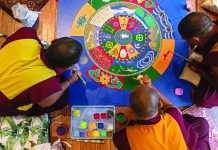By Denny Freidenrich
I knew my friend William had a Bar Mitzvah, but I never pictured him as a particularly religious person. That is, until Oct. 7. Watching the news and reading everything he could find, the retired international business attorney immediately set a plan in motion to volunteer wherever he was needed in Israel. Here are excerpts from my interview with William. Note that his last name has been withheld for safety concerns.

Q: What motivated you to travel to Israel in December and then again in January?
A: Like many people, I was shocked by the attacks on Oct. 7.
I had never been to Israel before, but instinctively knew I had to help, in some small way, the people affected.
Because I spent years in the healthcare arena, I was drawn to an organization called American Friends of Sheba Medical Center. The result was my signing up for two missions in support of Sheba Medical Center in Tel Aviv.
Before I began my volunteering at the medical center, I was encouraged to visit the kibbutz closest to Gaza that had been brutally attacked to bear witness. It was a gut-wrenching experience, but I felt it was important to see first-hand what exactly had happened.
Q: Tell me about the medical center.
A: I was extremely impressed with Sheba Medical Center. It is a complex comprised of six hospitals.
While Israel is a small country, nevertheless, Sheba is its own small city on the edge of Tel Aviv. It is home to the largest medical center in the Middle East. The center’s 1,700 physicians and 10,000 healthcare professionals see more than 1.6 million patients a year. The use of advanced technology, including sophisticated artificial intelligence, is fascinating.
Q: Generally speaking, what was happening at the hospital when you were there?
A: Staff was focused on treating a significant number of people wounded in the Oct. 7 attacks as well as soldiers and civilians subsequently wounded in the war. It also is the hospital that has received the most hostages after their release.
Despite the doctors and entire staff clearly working grueling hours as a consequence of the war, they also were proud that they never had to turn out or turn away existing or new patients unrelated to the war. As a sidebar story, I know some pediatric ICU patients had to be moved to a safer location within the complex. During my first visit to the medical center in December, I did have to seek shelter once due to incoming missiles having been launched.
Q: What did you do as a volunteer?
A: After attending several briefing sessions, including one from the CEO of the medical center, I ended up packing boxes at the warehouse/logistics center for delivery of medicines and supplies to the various sections of the medical center. I also packed lunches for the pediatric wing and donated blood. One of the benefits of volunteering was the opportunity to visit with wounded soldiers and young patients and their families. I was able to witness the incredible resilience of the young, wounded soldiers as well as the support they received from friends in their military units. I’ll never forget how appreciative the soldiers and their families were when we hosted a barbecue to boost their spirits.
Q: What else stood out to you from this experience?
A: First and foremost, it was heart-warming to see the approach to medical care at Sheba. The optimistic, “can do” spirit of the healthcare professionals and staff truly is inspiring. The medical center culture is holistic in nature, with a focus not only on the physical health of its patients but their mental health as well.
The hospitals within the medical center are designed to feel like home as much as possible. This was particularly important in handling the returning hostages. The team at Sheba created a very detailed plan and drilled on every detail to make sure the hostages were as comfortable as possible from the moment they reached the safety of the hospital. The return of so many hostages was unprecedented in terms of medical care. Many people I met expressed great concern about the impact PTSD has already had on survivors since Oct. 7 and most certainly will have on Israelis going forward. Lastly, I think it is important to know that 25% of the employees (doctors, nurses and staff) at Sheba are Arab-Israeli, and everyone works side by side in the operating rooms and everywhere else in the interests of the patients from Israel and beyond. In that regard, Sheba Medical Center is a model that brings some hope for a peaceful future in the region.
Q: Are you planning to go back?
A: I will definitely go back again. I’ve met some remarkable people — doctors, staff, researchers and members of innovation teams. I was deeply moved by the culture and spirit that I felt at Sheba. It’s been a privilege to volunteer there. Clearly, I am a different person for having recently been to Israel. If anyone wants to volunteer, like I have, then I urge them to contact the American Friends of Sheba Medical Center.
Denny Freidenrich is a 1970 graduate of USC. He first moved to Laguna Beach more than 50 years ago.





What a great inspiration you are William and thank you for sharing this Denny F. What took place that dreadful day will forever haunt me, the pictures still in my mind, it is hard for me to see what one side of humanity does to another..It is heartbreaking, you followed your soul William and will be a deeper person for it. My heart goes out to Israel, may you heal and know you have millions of prayers!